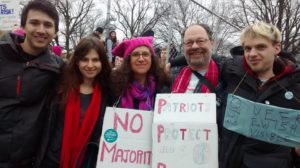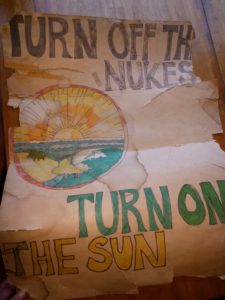50 years ago today, October 15, 1969, my life changed forever. That was the day I became an activist, for real.
Yes, there was a time when as a toddler, I destroyed the cigarettes my parents’ party guests left lying around on the coffee table to protect the air quality of our apartment. Yes, there was the one-kid boycott I started that summer of 1969 of a movie theater that charged me for an adult ticket and made me sit in the children’s section (and I have still never been back to that theater). Yes, I grew up in a social change household and my mom dragged me around with her as she campaigned for Eugene McCarthy in 1968. Yes, I had already decided to become a vegetarian, although my mom had extracted a promise to wait until I stopped growing. So I was predisposed. But I wasn’t an activist yet.
But that day, I participated in the national Vietnam Moratorium Day—which is why I still remember the date—and went to my first peace rally. Alone, I walked the few blocks from our apartment building on Loring Place at Tremont Avenue to NYU’s Bronx campus (now Bronx Community College), where I listened to the speakers.

Marching at the Women’s March on Washington with my wife and children (from left: son-in-law Bobby, daughter Alana, wife Dina, me, son Rafael)
I was 12 years old, and had just started 9th grade.
One of the speakers, who was probably only about 6 years older than me, proclaimed, “The Vietnam war is an undeclared war.”
I hadn’t known that.
And with this statement, my whole world came crashing down. All my faith in the checks and balances of the American system of government that I’d learned from social studies teachers turned out to be a lie. I started questioning everything I knew.
I still show up at many demonstrations. In the photo above, I’m holding a sign that says “Patriots Protect People and Planet” that I made for that protest: the Women’s March counterinaugural on January 21, 2017. A few days later, I turned it over and wrote “Another Jew for Human Rights,” and brought it to protest the administration’s first attempt at a Muslim ban. Both sides of that sign have gotten quite a workout the past 2-3/4 years.
But I learned early that showing up at demonstrations isn’t enough.
When my carefully constructed world fell apart on that October day in 1969, I started looking for ways to make a difference. To find that path back to the democracy I’d been promised, to make sure the system worked so the next time the US went to war, it would have at least been vetted by Congress (little did I know how THAT would play out! Most American wars since then have also been undeclared.) And to work for peace.
So peace and democracy were my first causes. A few months later, the first Earth Day added the environment to my focus. Over the years, I took up many others: human rights/opposing discrimination, safe energy, affordable housing, food and transportation justice, social change journalism, dialogue across differences, and many subsets and intersections of these.
Before long, I was joining organizations, writing and publishing about social change actions (starting with articles in an alternative paper at my high school when I was 15), planning events from speakers to rallies to the safe energy “swim-in” where I gave my first TV interview dripping wet in my bathing suit, building coalitions, doing the hard work of helping to build movements–and making tons of friends, by the way. In fact, I’m going to a meeting of our Western Massachusetts Jews for Immigration Justice meeting this afternoon, where we’ll debrief a successful mass rally we held last week and plan our next steps.
Many of these were just as accidental or based on a random insight as my original peace activism.
Although I joined my first two environmental action groups (one in my neighborhood and one in my high school) I only got into the safe energy movement in a real way after researching “the pros and cons of nuclear power” for a college paper in 1974—and that in turn led directly to my getting involved with Clamshell Alliance and getting arrested at Seabrook three years later (another life-changing moment). This is the sign I carried to that action.
My paths to human rights and opposing discrimination came in part from being told I was too young to count when I was an early activist, in part from my own coming out as bisexual as a 16-year-old college freshman, in part from being hired at age 22 for my one and only paid organizing job—charged with building a near-defunct Gray Panther chapter in Brooklyn (as a VISTA Volunteer with pay the first year of $82 a week in NYC!), in part from a growing awareness of disability issues as a 6-year member of Northampton’s official city Disability Committee, and in part from seeing the urban poverty all around me in the various cities I lived in as a child or during college internships—such as the ghetto neighborhood in Washington, DC I walked through on my way to work, or the one I biked through to visit my then-girlfriend (now wife of 36 years) in Brooklyn.
But it also comes from inserting myself into situations where some people might think I don’t belong—whether attending poetry gatherings in black neighborhoods or staying in Arab and Druze villages in Israel or visiting a colleague in Ramallah (Palestine).
Founding Save the Mountain was an accident of geography. I had only been living in the neighborhood we saved for just over a year when a developer announced plans to destroy it. And my work this past summer on immigration justice was also an accident.
Yet, after all these years, I am still deeply involved in those first three issues that found me: peace, the environment, and democracy. I’ve changed the way I participate—for instance, speaking to the business community on how social change and environmental healing can be profitable—but they are still very much a part of who I am.
I am grateful to that long-ago young man, and I wish I knew his name to say thank-you. I wouldn’t be the person I am today without his speech.
When I started, I was told I was too young to make change, and now, at 62, I’m beginning to hear that I’m too old, But as teen activist Emma Gonzales would say, I “call B.S.” on both claims. Like many of my friends and mentors, I expect to continue being an activist into my 90s and even 100s, if I live that long.
